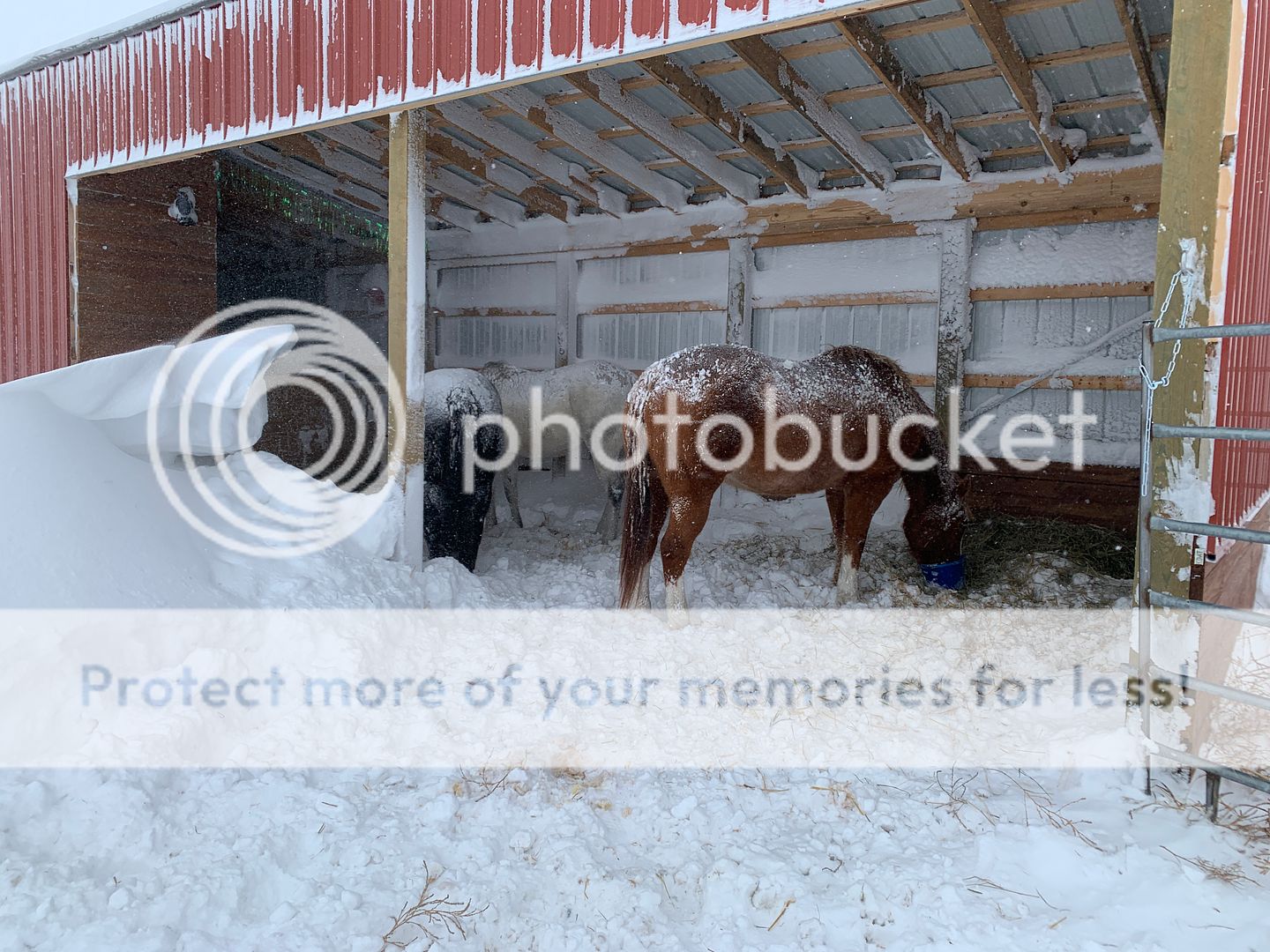I’m heading into unknown territory --> Heaves. 
I’m sorry, this is a novel!
I have a 7-year-old quarter horse mare, Lilly. This will be my 3rd year with her. All of a sudden this week, she seems to have an episode of heaves. I have 3 horses and they are outside 24/7. I feed round bales in the winter with a HayChix net on it. In the warmer months, they graze. This is my set up and I’ve done it for years.
I bought Lilly in April of 2021. No issues at all the first year, no coughing, no breathing issues, etc. The only thing I can perhaps say is she did have trouble catching her breath one time after a barrel race in mid-September 2020. It was a 3-day barrel race and it was the first night. She never has any trouble catching her breath after a run but she did that night. I thought it was because I tried Red Cell on her for the first time (with the okay from my vet). That was our first race since I added that and I obviously stopped it after that because I thought it made her heart race or something dumb like that.
The only other thing notable about 2021 was that we had a severe drought year. So everything everywhere was dusty and dry. All 3 of my horses were coughing a little bit here and there, nothing extreme, but we were in a severe drought. So I don’t know if that matters or not, but I guess it’s part of the history.
Last year 2022, I bought a nebulizer (FlexiNeb). I didn’t really have a certain NEED for it, but I actually bought it with my other horse in mind. But I figured it’s not going to hurt her to be on it too. All 3 of my horses still had that little bit of a cough over the winter that carried on from the prior fall due to the horrible drought. With the nebulizer, the coughs cleared up very quickly. I did also start 2 of my 3 horses on CEP Daily Lung at the same time as starting the nebulizer, so I guess I can’t fully say it was the nebulizer. I didn’t feel it made any difference whatsoever for my other horse during the year, nor for Lilly (who didn’t have any issues), so I actually sold my nebulizer last fall. If something doesn’t seem to be working for my program, then I ditch it.
But throughout 2022, I probably did about 45 days of the CEP daily lung that spring, then I discontinued it when I ran out. But continued with the nebulizer, roughly once a week. Maybe twice a week if we were going to a race. One day, I was at a playday type show where they had numerous events. I can’t remember exactly but Lilly would have probably done 2 or 3 events prior, but she suddenly had trouble catching her breathe. It took her a while to recover, but she did. The arena was dusty that day. At the time, I didn’t really think about the other event the fall prior, because I had seriously thought the Red Cell did it. But now that I am thinking back, is it connected?
We’ve had a horrible, horrible winter this winter. Blizzard after blizzard after blizzard. I had noticed that she has been coughing a little bit over the winter, but it didn’t start right away. My other 2 horses haven’t really been coughing at all. I didn’t think much of it for Lilly since she got a little coughy last winter too. So I just started her back on the CEP Daily Lung about a month ago. And her cough has improved and is nearly gone.
We’ve very slowly started getting back in shape again, because I’ve had nowhere to ride with mountains of snow everywhere.
On Sunday 4-9-23, I took my horses to an indoor riding arena for a private lesson with a nationally-known trained. I did a 2 hour session on her in the morning, and a session on my other horse in the afternoon. It is a heated arena (although not that warm) and she did get very sweaty inside, as I expected. I wouldn’t say she was worked super hard. We did some trotting circle exercises, and then the trainer rode her for a bit, working on neck reining. We didn’t do any loping at all. But she still got a workout, and she was breathing hard. She stood tied at the trailer outside while I rode my other horse, and she was fine and we went home.
Monday night 4-10-23, when I went outside after I got home from work, she was breathing heavy, like she was having trouble catching her breath, just standing there. I thought maybe she was hot. It was about 70 degrees, which was literally a heat wave for us in North Dakota (seriously, we had another blizzard just 5 days prior - not joking). So this was a huge temperature swing. I almost texted my vet but I though I would give it a day. Well, the next day Tuesday when I checked her after work, same thing. Still breathing hard and kinda struggling. So I consulted with my vet. With my work schedule this week, there is just no way I could get her to my vet (who is 2 hours away), and I’m unfortunately getting on a plane Tuesday to be out of town for a week for work, so this is just horrible timing. (Husband is non-horsey so little help from him.) Vet and I decided to get her on a course of dexamethasone IM. I picked it up from a local supply store on Wednesday and gave her the first dose when I got home.
She has been slowly improving. Last night (Thursday) she was breathing better, but still not back to normal. Today (Friday) again a little bit better but I could still see her breathing hard once in a while.
I was able to do a PEMF session on her Wednesday and again today.
Of course, I was a googling fiend on Wednesday night and I ordered a good omega-3 supplement from Total Health Equine and also ordered MVP Air-Way EQ. Those both arrived today and I gave them to her, along with her usual CEP Daily Lung. (The MVP and the CEP does double up on a couple ingredients, but they are more natural ones and I know you can feed double the dose of the CEP daily lung without problem.) I like that the MVP has MSM and Spirulina.
Hopefully she continues to get back to normal over the next few days before I have to fly out. She’ll get 7 days of dex treatment.
If you’ve read through my novel of details, thank you.
My big question is that I feel like there has been an exercise event each time. The first was a barrel run. The second was a speed event (can’t remember if it was barrels or poles or which event, but it was one of them). And third we had the session with the trainer where she got very sweaty and out of breath. (although not a cardiovascular exercise like running a speed event)
She was not eating from a round bale during the first two. I know that round bales are bad for RAO but also in my case, I do have a net on it so she isn’t burying her head inside and it literally gets snow on it. A lot. I know that’s not the same as wetting down hay, but I would think it speaks for something.
And I had her on a nebulizer for the second event.
So I am just trying to rack my brain on what is going on here and what the trigger may be. Maybe it helps to type it all out and have others give their two cents.
Obviously, when I am able, a vet visit is in order for other diagnostics but… if she’s got Heaves, it may or may not change the treatment outcomes.
If I made a mistake by selling my nebulizer, thinking it was not helping, I obviously can buy another. But I’m just not so sure. I’d like to give the omega-3 and the MVP supplements a chance to work.
The snow is melting and they are already going out to graze more, and eating less from the round bale. So I think that will be helpful. But I seriously have no idea what I will do if she can’t be managed somehow on the round bale. I don’t have a barn. We’ve only been on our place since 2020 so there are still lots of things in progress. I don’t know how I would keep her separate from the other two horses in the winter. I’ve only got one shelter they all share and I certainly cannot afford to put up a second one this year.
I know all horses are individuals and they will all respond differently to different treatments.
So I guess, thank for reading and welcome your suggestions.
I’ve never had a horse with a breathing issue before so this is new to me. (and I don’t like it one bit!!)
Last but not least, she is a stunning girl and an absolute sweetheart.


